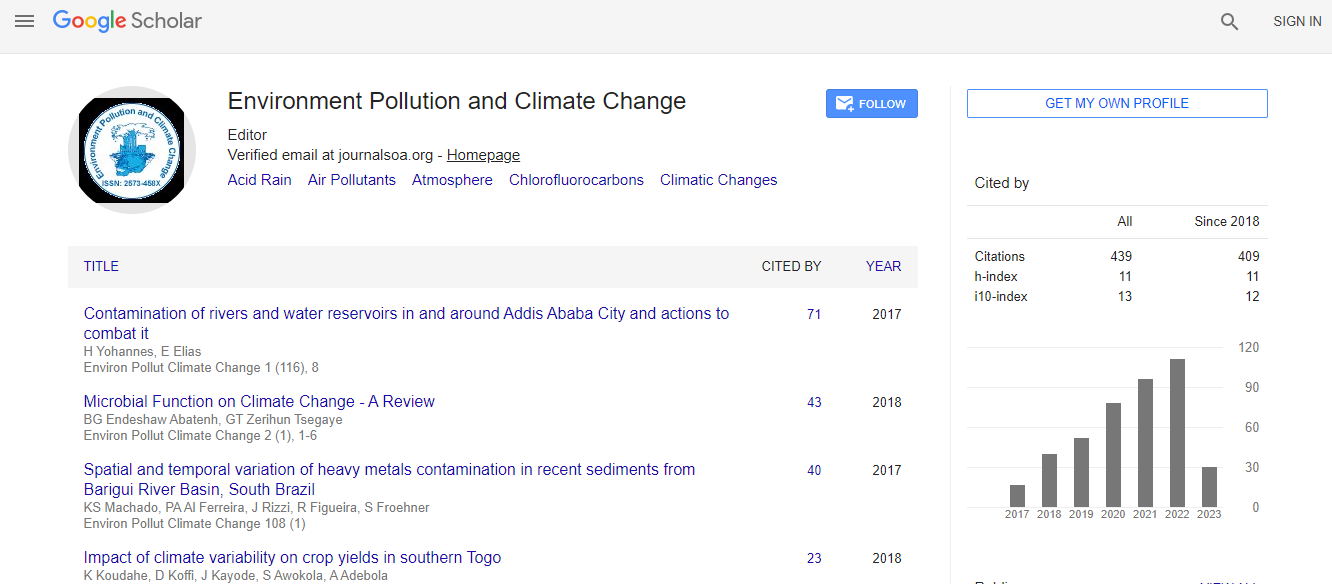Our Group organises 3000+ Global Conferenceseries Events every year across USA, Europe & Asia with support from 1000 more scientific Societies and Publishes 700+ Open Access Journals which contains over 50000 eminent personalities, reputed scientists as editorial board members.
Open Access Journals gaining more Readers and Citations
700 Journals and 15,000,000 Readers Each Journal is getting 25,000+ Readers
Google Scholar citation report
Citations : 672
Environment Pollution and Climate Change received 672 citations as per Google Scholar report
Environment Pollution and Climate Change peer review process verified at publons
Indexed In
- Google Scholar
- Publons
- Euro Pub
- ICMJE
Useful Links
Recommended Journals
Share This Page
The political ecology of climate change in Texas: A steep learning curve for West Texas wheat farmers
Joint Event on 5th World Conference on Climate Change & 16th Annual Meeting on Environmental Toxicology and Biological Systems
Sara E Alexander
Baylor University, USA
ScientificTracks Abstracts: Environ Pollut Climate Change
Abstract
We live in a world of climate uncertainty where farmers pursue a variety of means to diminish vulnerability, utilizing strategies to respond to and mitigate against the effects of climate change. Specific responses include seeking new knowledge and training, using particular agricultural technologies, relying on institutional resources, and turning to both personal and professional social networks. The traditional model of agriculture as “performance”, ultimately affirms that risks, such as challenges associated with climate change, are entrenched within a structure of social, economic and biophysical mechanisms that are continuously being managed by farmers. Agricultural systems are correspondingly found in a setting of commonly-shared worldviews, social complexities, values, and cultural norms. In this landscape, the decisions farmers reach, entail meaning and direction that may be far more complex than an analysis focused solely on the more pragmatic economic principles and agricultural productivity standards. Rather, they comprise the farmer’s intuitive reasoning and socialization in addition to his/her technical and resource management skills. The author will present findings from an ethnographic pilot study aimed to illuminate farmers’ perspectives on changing weather patterns, climate change forecasts and their implications for viability of farming enterprises, all within the context of Texas wheat production. With focus on livelihoods and cultural values, risk management, and weather and climate change in terms of decision-making and wheat farming in west Texas, the study emphasizes what motivates farmers and how they themselves value those factors that contribute to their goals and aspirations, how farmers see themselves addressing climate risk in the context of a wide array of pressures, and how farmers respond to the communication of predictive information in light of their sense of place and self. Recent Publications 1. Yohannes H (2016) A review on the relationship between climate change and agriculture. Journal of Earth Science and Climatic Change 7(2):335–342. 2. Brugger Julie and Michael Crimmins (2013) The art of adaptation: living with climate change in the rural American Southwest. Global Environmental Change 23:1830–1840. 3. Gosling Simon N and Nigel W Arnell (2013) A global assessment of the impact of climate change on water scarcity. Climatic Change 134(3):371–385. 4. Buys Laurie, E Miller and K van Megen (2012) Conceptualizing climate change in rural Australia: community perceptions, attitudes and (in) actions. Regional Environmental Change 12:237–248. 5. Scherr Sara J, Seth Shames and Rachel Friedman (2012) From climate-smart agriculture to climate-smart landscapes. Agriculture and Food Security 1:12–26.Biography
Sara E Alexander, as an Applied Environmental Anthropologist, the majority of her research projects focus on the dynamics of human populations and environmental change, specifically climate change in most cases. A project she recently completed in several coastal communities in Belize, addresses the ways in which households respond to climate-related shocks. The research involved determining levels of vulnerability and devising a Resilience Index to examine specific responses and coping strategies to climate-related disturbances. In 2014, she conducted research in the western interior region of Belize to determine awareness and level of understanding of climate change on the part of those working in the tourism industry.
E-mail: Sara_Alexander@baylor.edu

 Spanish
Spanish  Chinese
Chinese  Russian
Russian  German
German  French
French  Japanese
Japanese  Portuguese
Portuguese  Hindi
Hindi 
